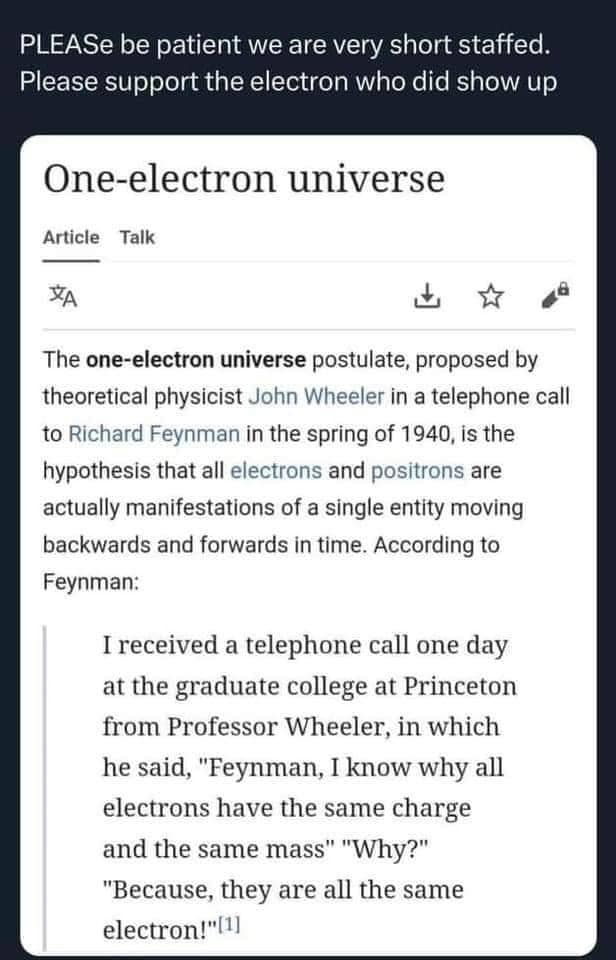this post was submitted on 28 Oct 2024
828 points (98.9% liked)
Science Memes
11081 readers
2726 users here now
Welcome to c/science_memes @ Mander.xyz!
A place for majestic STEMLORD peacocking, as well as memes about the realities of working in a lab.

Rules
- Don't throw mud. Behave like an intellectual and remember the human.
- Keep it rooted (on topic).
- No spam.
- Infographics welcome, get schooled.
This is a science community. We use the Dawkins definition of meme.
Research Committee
Other Mander Communities
Science and Research
Biology and Life Sciences
- [email protected]
- [email protected]
- [email protected]
- [email protected]
- [email protected]
- [email protected]
- [email protected]
- [email protected]
- [email protected]
- [email protected]
- [email protected]
- [email protected]
- [email protected]
- [email protected]
- [email protected]
- [email protected]
- [email protected]
- [email protected]
- [email protected]
- [email protected]
- [email protected]
- [email protected]
- [email protected]
- [email protected]
- !reptiles and [email protected]
Physical Sciences
- [email protected]
- [email protected]
- [email protected]
- [email protected]
- [email protected]
- [email protected]
- [email protected]
- [email protected]
- [email protected]
Humanities and Social Sciences
Practical and Applied Sciences
- !exercise-and [email protected]
- [email protected]
- !self [email protected]
- [email protected]
- [email protected]
- [email protected]
Memes
Miscellaneous
founded 2 years ago
MODERATORS
you are viewing a single comment's thread
view the rest of the comments
view the rest of the comments

So if I can destroy 1 electron I destroy every electron?
You would need a positron to do that and all you might have done is reflect it backwards in time.
If you could "remove" it by placing it into another dimension, it might disprove the theory, but the causal domain might be larger then previous assumed.
This is one of those Math Theories that isn't technically a Science Theory. We can make a mathematical model, but it's untestable.
Only in its future. Probably you’d have to find the electron precisely at the end of its timeline.
So I have to destroy 2 electrons to fuck over causality.
How could you destroy 2, if there's only one?
That's why it would fuck over causality. If I destroyed 1 that could be the natural end of the electrons "life" of bouncing back and forth through time. I would need to destroy a 2nd which would then have to be the same electron from earlier in it's timeline.
Ah, you're viewing it as a timetravellers' dilemma.
My view was more that we're an observer in the lagrangian solution to the differential equation we call life. The electron, being a constant in the equation. Remove the electron, you alter the equation, therefore destroying known life.
Careful, reality might just destroy you instead to avoid the paradox. I suspect that's how it avoids all of the paradoxes if time travel is possible in a single timeline universe. And this idea isn't compatible with the multiple timeline time travel idea (otherwise the electron will end up in a different timeline each time it jumps backwards).
If you destroy it, that will be the end of its timeline
To destroy every other quantum state of the single electron, wouldn't you need to destroy it at its beginning state? The end state would be at/just after the heat death of the universe, so it wouldn't really make any difference then.
The end state doesn't have to be at the end of time if the electron can travel backwards in time. It can go to the end, head back towards the beginning, and get destroyed somewhere in between.
Strictly speaking it would have to get destroyed at some point, or at least have something stop it from going back and forth, otherwise the universe would be all electron.
Thanos should have picked a better strategy
Do it.
Let's try it and find out!
I mean...if energy can not be created nor destroyed, it kind of lends to this hypothesis... 🤔
E=mc2 is the equation for how much energy is created by destroying a given amount of mass.
No, E=mc^2^ demonstrates that mass and energy are one in the same. When converting mass to energy, nothing is being destroyed, merely changing state. As far as we are aware, the absolute destruction or removal of energy, and thereby matter, from the Universe is not possible.